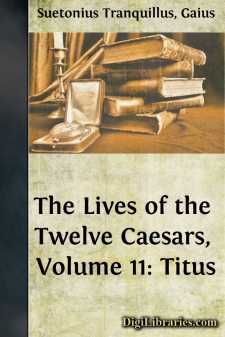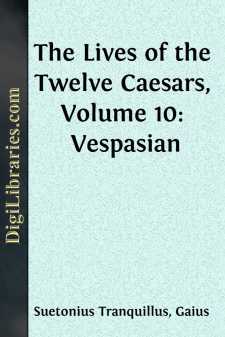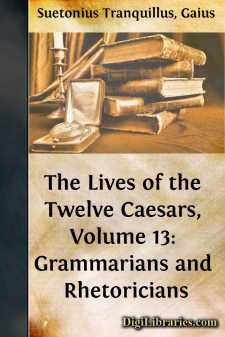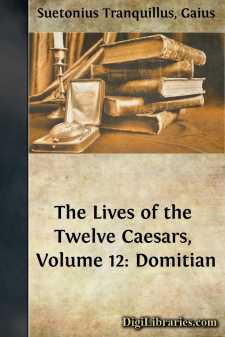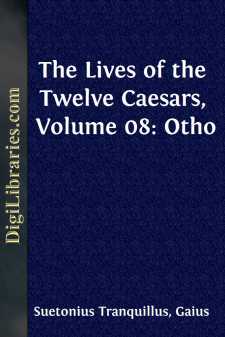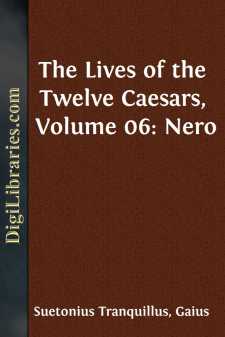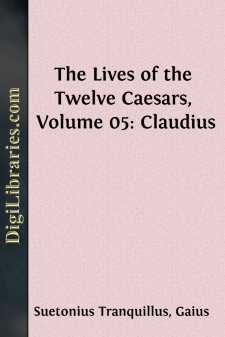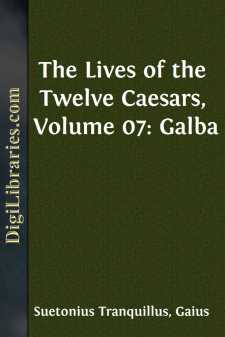Categories
- Antiques & Collectibles 13
- Architecture 36
- Art 48
- Bibles 22
- Biography & Autobiography 813
- Body, Mind & Spirit 142
- Business & Economics 28
- Children's Books 15
- Children's Fiction 12
- Computers 4
- Cooking 94
- Crafts & Hobbies 4
- Drama 346
- Education 46
- Family & Relationships 57
- Fiction 11828
- Games 19
- Gardening 17
- Health & Fitness 34
- History 1377
- House & Home 1
- Humor 147
- Juvenile Fiction 1873
- Juvenile Nonfiction 202
- Language Arts & Disciplines 88
- Law 16
- Literary Collections 686
- Literary Criticism 179
- Mathematics 13
- Medical 41
- Music 40
- Nature 179
- Non-Classifiable 1768
- Performing Arts 7
- Periodicals 1453
- Philosophy 64
- Photography 2
- Poetry 896
- Political Science 203
- Psychology 42
- Reference 154
- Religion 513
- Science 126
- Self-Help 84
- Social Science 81
- Sports & Recreation 34
- Study Aids 3
- Technology & Engineering 59
- Transportation 23
- Travel 463
- True Crime 29
Gaius Suetonius Tranquillus
Gaius Suetonius Tranquillus was a Roman historian and biographer born around AD 69, known for his significant work, "De Vita Caesarum" (The Lives of the Twelve Caesars), which provides detailed biographies of Julius Caesar and the first eleven Roman emperors. Serving under Emperor Hadrian as a secretary and later as the director of the imperial archives, Suetonius had access to numerous official documents, allowing him to create rich and sometimes scandalous accounts of his subjects' lives. His writings offer valuable insights into the personal and political intrigues of the early Roman Empire, blending historical facts with anecdotal and sometimes sensational details.
Author's Books:
Sort by:
THE LIFE OF TERENCE. Publius Terentius Afer, a native of Carthage, was a slave, at Rome, of the senator Terentius Lucanus, who, struck by his abilities and handsome person, gave him not only a liberal education in his youth, but his freedom when he arrived at years of maturity. Some say that he was a captive taken in war, but this, as Fenestella [925] informs us, could by no means have been the case,...
more...
TITUS FLAVIUS VESPASIANUS AUGUSTUS. (465) I. Titus, who had the same cognomen with his father, was the darling and delight of mankind; so much did the natural genius, address, or good fortune he possessed tend to conciliate the favour of all. This was, indeed, extremely difficult, after he became emperor, as before that time, and even during the reign of his father, he lay under public odium and...
more...
T. FLAVIUS VESPASIANUS AUGUSTUS. (441) I. The empire, which had been long thrown into a disturbed and unsetted state, by the rebellion and violent death of its three last rulers, was at length restored to peace and security by the Flavian family, whose descent was indeed obscure, and which boasted no ancestral honours; but the public had no cause to regret its elevation; though it is acknowledged that...
more...
LIVES OF EMINENT GRAMMARIANS (506) I. The science of grammar [842] was in ancient times far from being in vogue at Rome; indeed, it was of little use in a rude state of society, when the people were engaged in constant wars, and had not much time to bestow on the cultivation of the liberal arts [843]. At the outset, its pretensions were very slender, for the earliest men of learning, who were both...
more...
TITUS FLAVIUS DOMITIANUS. (479) I. Domitian was born upon the ninth of the calends of November [24th October] [795], when his father was consul elect, (being to enter upon his office the month following,) in the sixth region of the city, at the Pomegranate [796], in the house which he afterwards converted into a temple of the Flavian family. He is said to have spent the time of his youth in so much...
more...
A. SALVIUS OTHO. (416) I. The ancestors of Otho were originally of the town of Ferentum, of an ancient and honourable family, and, indeed, one of the most considerable in Etruria. His grandfather, M. Salvius Otho (whose father was a Roman knight, but his mother of mean extraction, for it is not certain whether she was free-born), by the favour of Livia Augusta, in whose house he had his education, was...
more...
AULUS VITELLIUS. (427) I. Very different accounts are given of the origin of the Vitellian family. Some describe it as ancient and noble, others as recent and obscure, nay, extremely mean. I am inclined to think, that these several representations have been made by the flatterers and detractors of Vitellius, after he became emperor, unless the fortunes of the family varied before. There is extant a...
more...
NERO CLAUDIUS CAESAR. (337) I. Two celebrated families, the Calvini and Aenobarbi, sprung from the race of the Domitii. The Aenobarbi derive both their extraction and their cognomen from one Lucius Domitius, of whom we have this tradition: —As he was returning out of the country to Rome, he was met by two young men of a most august appearance, who desired him to announce to the senate and people a...
more...
I. Livia, having married Augustus when she was pregnant, was within three months afterwards delivered of Drusus, the father of Claudius Caesar, who had at first the praenomen of Decimus, but afterwards that of Nero; and it was suspected that he was begotten in adultery by his father-in-law. The following verse, however, was immediately in every one's mouth: Tois eutychousi kai primaena paidia....
more...
SERGIUS SULPICIUS GALBA. (400) I. The race of the Caesars became extinct in Nero; an event prognosticated by various signs, two of which were particularly significant. Formerly, when Livia, after her marriage with Augustus, was making a visit to her villa at Veii [639], an eagle flying by, let drop upon her lap a hen, with a sprig of laurel in her mouth, just as she had seized it. Livia gave orders to...
more...



